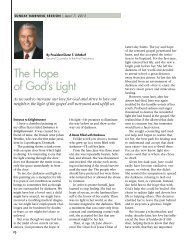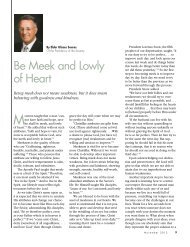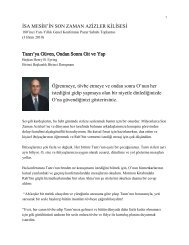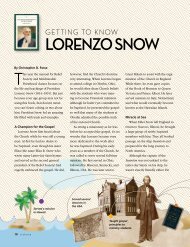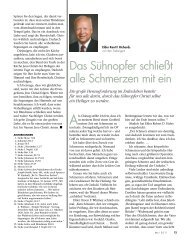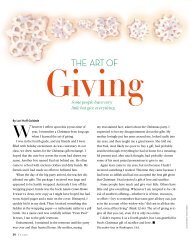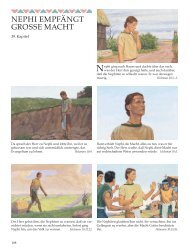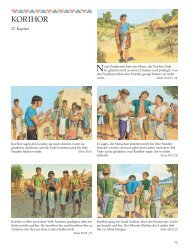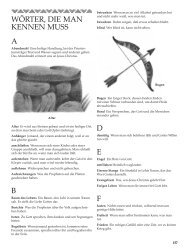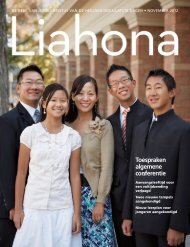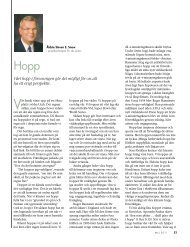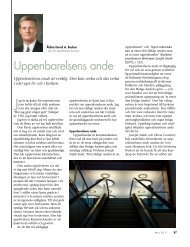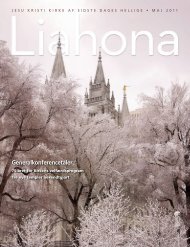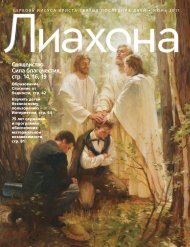Ensign, Nov. 2007 - The Church of Jesus Christ of Latter-day Saints
Ensign, Nov. 2007 - The Church of Jesus Christ of Latter-day Saints
Ensign, Nov. 2007 - The Church of Jesus Christ of Latter-day Saints
You also want an ePaper? Increase the reach of your titles
YUMPU automatically turns print PDFs into web optimized ePapers that Google loves.
Nourished by the<br />
Good Word <strong>of</strong> God<br />
DANIEL K JUDD<br />
First Counselor in the Sun<strong>day</strong> School General Presidency<br />
It is vital that we nourish those we teach and lead<br />
by focusing on the fundamental doctrines, principles,<br />
and applications emphasized in the scriptures<br />
and the words <strong>of</strong> our latter-<strong>day</strong> prophets.<br />
As a young man I worked with<br />
my father and brothers raising<br />
cattle and horses on our<br />
ranch in southern Utah and northern<br />
Arizona. My father taught us that<br />
when we wanted to catch one <strong>of</strong> our<br />
horses to ride, all we had to do was to<br />
put a handful <strong>of</strong> grain into a bucket<br />
and shake it for several seconds. It<br />
didn’t matter if the horses were in a<br />
corral or a large field; they would<br />
come on the run to eat the grain. We<br />
could then gently slip a bridle over<br />
their heads while they were eating.<br />
I was always amazed that such a simple<br />
process worked so well.<br />
On some occasions, when we<br />
didn’t want to take the time to get<br />
the grain from the barn, we would<br />
put dirt in the bucket and shake it,<br />
attempting to trick the horses into<br />
thinking that we had grain for them<br />
to eat. When they discovered our<br />
deception, some <strong>of</strong> the horses stayed,<br />
but others would run away and be<br />
nearly impossible to catch. It <strong>of</strong>ten<br />
took several <strong>day</strong>s to regain their trust.<br />
We learned that taking the time to<br />
consistently feed our horses grain<br />
made them much easier to work with<br />
and provided them with increased<br />
nourishment and greater strength.<br />
Even though many years have<br />
passed since my <strong>day</strong>s on the ranch,<br />
the experience I have just described<br />
has helped me as I have considered<br />
the following question: What can we<br />
as teachers and leaders in the <strong>Church</strong><br />
do to provide increased doctrinal and<br />
spiritual nourishment for those we<br />
serve?<br />
Elder Jeffrey R. Holland has<br />
taught: “Most people don’t come<br />
to church looking merely for a few<br />
new gospel facts or to see old friends,<br />
though all <strong>of</strong> that is important. <strong>The</strong>y<br />
come seeking a spiritual experience.<br />
<strong>The</strong>y want peace. <strong>The</strong>y want<br />
their faith fortified and their hope<br />
renewed. <strong>The</strong>y want, in short, to be<br />
nourished by the good word <strong>of</strong> God,<br />
to be strengthened by the powers <strong>of</strong><br />
heaven. Those <strong>of</strong> us who are called<br />
upon to speak or teach or lead have<br />
an obligation to help provide that, as<br />
best we possibly can.” 1<br />
<strong>The</strong> Savior and His servants have<br />
not only taught us the importance <strong>of</strong><br />
helping others be “nourished by the<br />
good word <strong>of</strong> God” (Moroni 6:4);<br />
they have also provided inspired<br />
direction concerning how teaching<br />
and leading can best be accomplished.<br />
Section 50 <strong>of</strong> the Doctrine<br />
and Covenants is one <strong>of</strong> many references<br />
that provide such valuable<br />
counsel. After acknowledging the concerns<br />
that existed in some <strong>of</strong> the early<br />
branches <strong>of</strong> the <strong>Church</strong>, the Savior<br />
instructed a group <strong>of</strong> leaders concerning<br />
the solution to the problems they<br />
were facing. His instructions began by<br />
asking a vital question: “Wherefore,<br />
I the Lord ask you this question—<br />
unto what were ye ordained?” (D&C<br />
50:13). <strong>The</strong> Lord’s familiar answer<br />
follows in verse 14: “To preach<br />
my gospel by the Spirit, even the<br />
Comforter which was sent forth to<br />
teach the truth.”<br />
<strong>The</strong> answers to the problems the<br />
<strong>Saints</strong> were facing in 1831 are the<br />
same for the challenges we are facing<br />
to<strong>day</strong>—we are to teach the gospel<br />
<strong>of</strong> <strong>Jesus</strong> <strong>Christ</strong> by the power <strong>of</strong> the<br />
Holy Ghost.<br />
Section 50 includes several vital<br />
keys to providing nourishment for<br />
those we teach and those we lead.<br />
<strong>The</strong> first key is found in the Savior’s<br />
admonition to “preach my gospel”<br />
(D&C 50:14, emphasis added).<br />
<strong>The</strong> scriptures clearly teach that the<br />
gospel we are to preach isn’t the<br />
“wisdom <strong>of</strong> the world” (Mosiah 24:7)<br />
but the “doctrine <strong>of</strong> <strong>Christ</strong>” (2 Nephi<br />
31:21). While the gospel <strong>of</strong> <strong>Jesus</strong> <strong>Christ</strong><br />
embraces all truth, not all truths are<br />
<strong>of</strong> equal value. 2 <strong>The</strong> Savior clearly<br />
taught that His gospel, first and foremost,<br />
is His atoning sacrifice. His<br />
NOVEMBER <strong>2007</strong> 93



